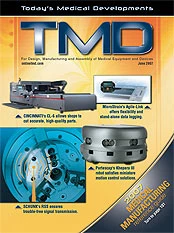
THE BLUE CROSS AND BLUE SHIELD ASSOCIATION (BCBSA) RECENTLY CALLED UPON CONGRESS to enact legislation to establish a new, independent institute – funded by all healthcare payers – to offer consumers and providers muchneeded information on which medical treatments work best. This proposal is an important component of a multipronged strategy BCBSA will be announcing in the coming months to improve healthcare value and quality for consumers.
It is estimated that up to 30% of health cares pending pays for ineffective, inappropriate or redundant care. As policymakers debate how best to reform our healthcare system, BCBSA believes it is critical to start by developing the knowledge base to empower patients and providers with credible information to ensure the delivery of appropriate and timely care.
Under BCBSA's proposal, the institute would support research, comparing the effectiveness of new and existing medical procedures, drugs, devices and biologics. The institute would support a broad range of research, including much-needed clinical trials, and be governed by a board representing stakeholders in the government and private sector.
BCBSA proposes funding the institute by assessing all private (insured and self-funded) and public healthcare coverage such as Medicare, Medicaid, and other gover nment programs. BCBSA is prepared to contribute substantial financial support to the initiative.
To ensure the new research improves clinical practice, significant education and incentives will be needed. BCBSA recommends that the new information be quickly and efficiently disseminated to providers, patients and others, and that the research results be incorporated into clinical practice guidelines through close collaboration with medical societies.
Another important element of the proposal calls for physicians who rely on practice guidelines, established through the institute's research, to be given safe harbor for non-economic and punitive damages when faced with claims of medical malpractice.
"The institute would close critical gaps in our medical understanding of the efficacy of certain treatments and, in the end, improve the quality of care for America," says Dr. John Fallon, chief physician executive, Blue Cross Blue Shield of Massachusetts. "Collaboration among key stakeholders, including providers and consumers, will be essential to the success of this effort." A summary of the proposal and more information can be found online at www.bcbs.com/issues/transparency.

Explore the June 2007 Issue
Check out more from this issue and find your next story to read.
Latest from Today's Medical Developments
- HERMES AWARD 2025 – Jury nominates three tech innovations
- Vision Engineering’s EVO Cam HALO
- How to Reduce First Article Inspection Creation Time by 70% to 90% with DISCUS Software
- FANUC America launches new robot tutorial website for all
- Murata Machinery USA’s MT1065EX twin-spindle, CNC turning center
- #40 - Lunch & Learn with Fagor Automation
- Kistler offers service for piezoelectric force sensors and measuring chains
- Creaform’s Pro version of Scan-to-CAD Application Module





